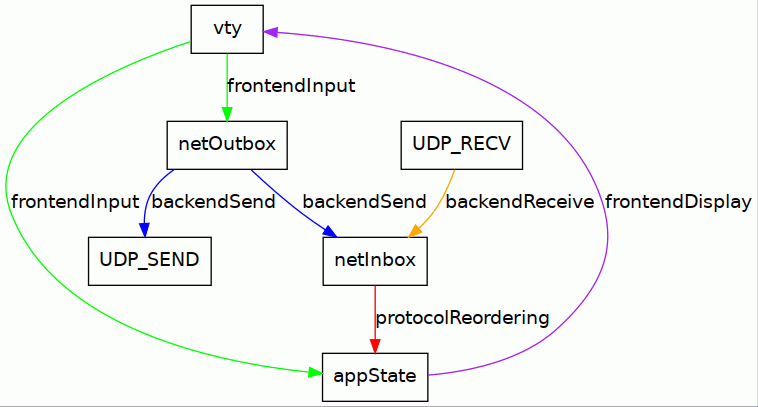This is a small haskell program implementing a udp broadcast chat client.
- You can run with..
bcast usernameto broadcast on a LAN, or..bcast username listenHost listenPort [destHost destPort ...]to specify alternate destination addresses.
- Type words, use the left, right, home, end keys to move the cursor.
- Press enter to send.
- Press escape to quit. (
/quitisn't a command, just for show)
- A
vtyis used to get events from the user and display the UI. - A
TVarappStateis the content which is displayed in the UI. - A
TChannetOutboxis the outgoing event buffer. - A
TChannetInboxis the incoming event buffer. - A socket is used to send and receive on the network.
- frontendInput: Block until a
vtyevent, apply the event toappState, optionally emit tonetOutbox.- Not all
vtyevents require a network event. When typing into the buffer, events are handled by applying toappStatedirectly so the UI can update. When you press the "Enter" key, the buffer is cleared and a network event is emitted.
- Not all
- fontendDisplay: Render
appStatetovtyand then block untilappStatechanges. - backendSend: Block until a
netOutboxevent, broadcast it to the network (and also copy it over tonetInbox).- We copy events directly from the outbox to the inbox because the user shouldn't have to wait for the network to get feedback from the UI. If you're implementing a message-delivery protocol, then you might be required to order outgoing messages, and so this behavior might be incorrect.
- backendReceive: Block until the network receives a packet, deserialize it
and emit to
netInbox. - protocolReordering: Block until a
netInboxevent and apply it toappState.- This is kind of a silly thread that doesn't do very much but shuffle things between references. It's somewhat of a placeholder for if you were implementing a message-delivery protocol. Much of the time you'd need to reorder and delay received messages before delivering them to the application. This thread might be where that code would go?
vtyprovides the UI.networkprovides the sockets.asyncprovides threads.stmprovides mutable references which can be accessed atomically.

